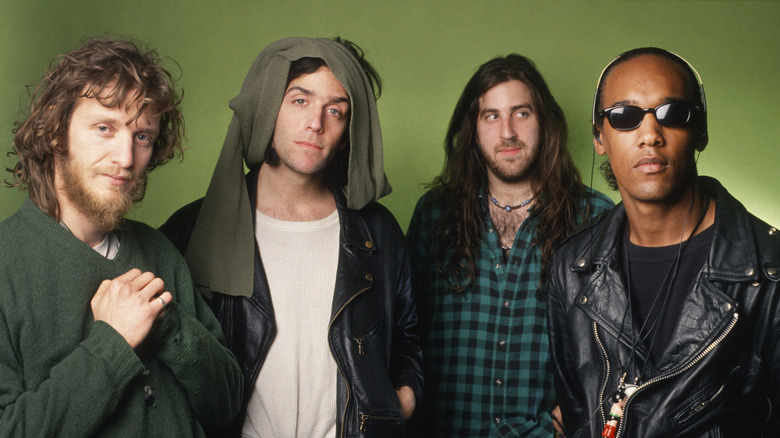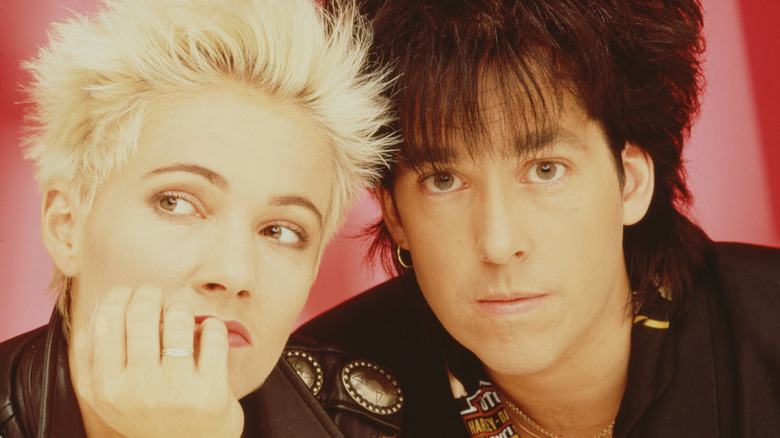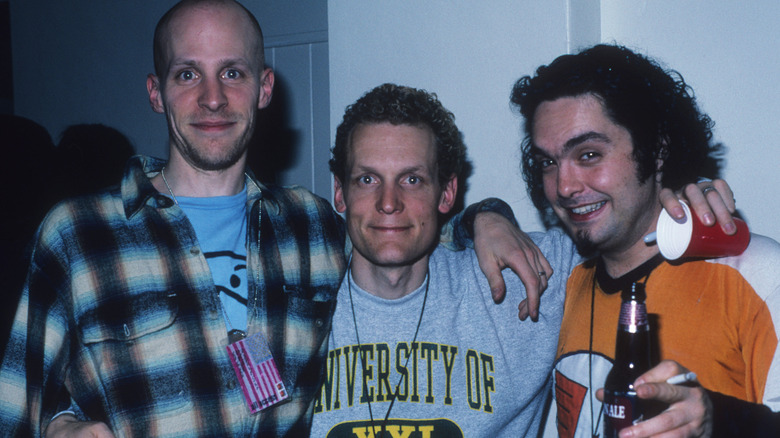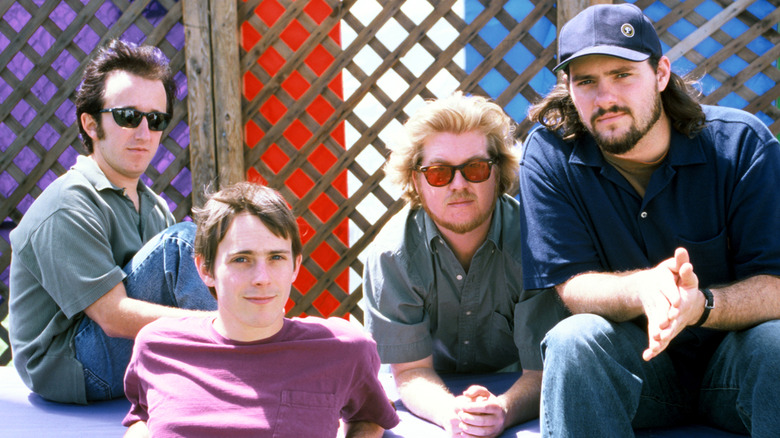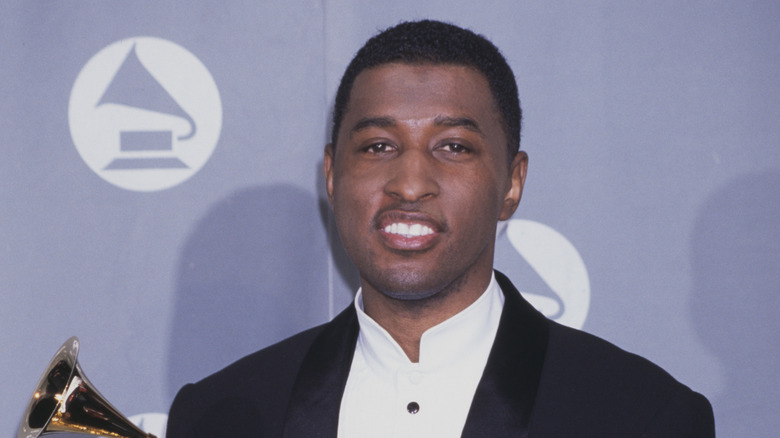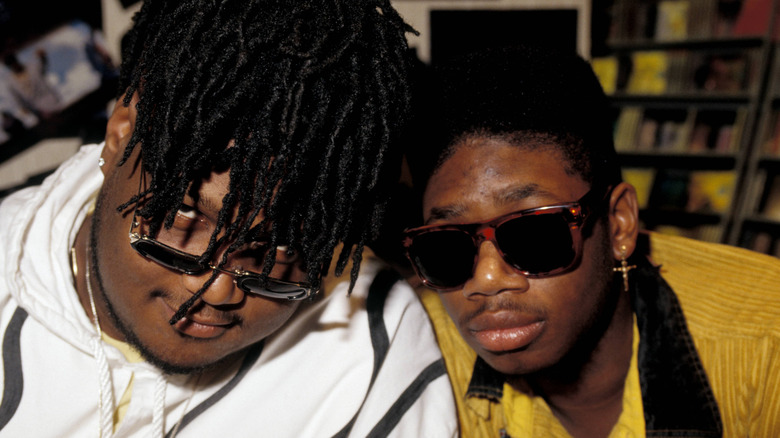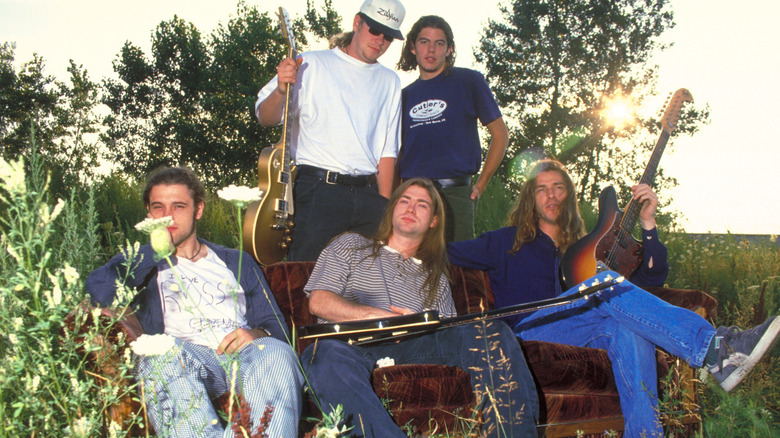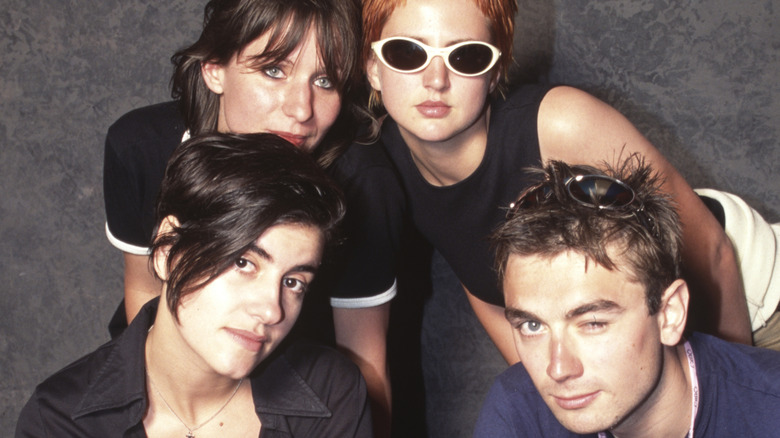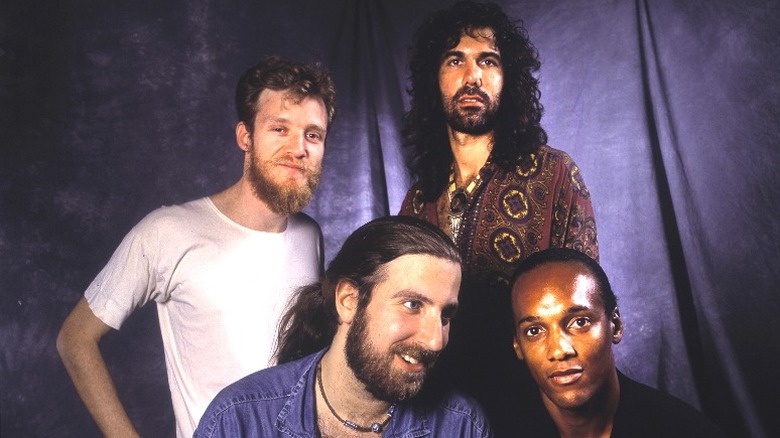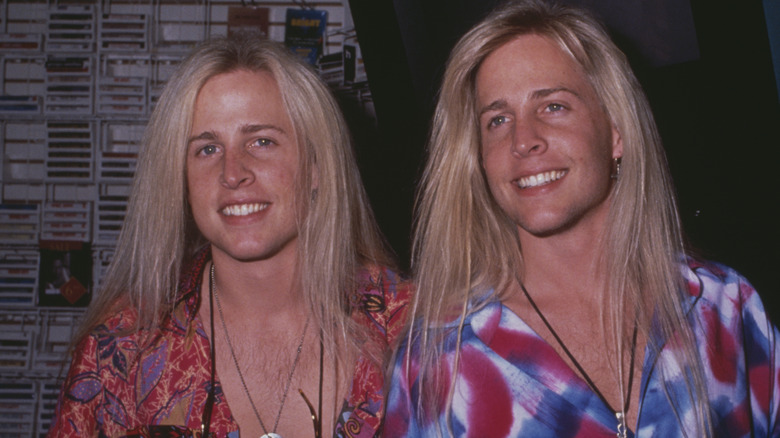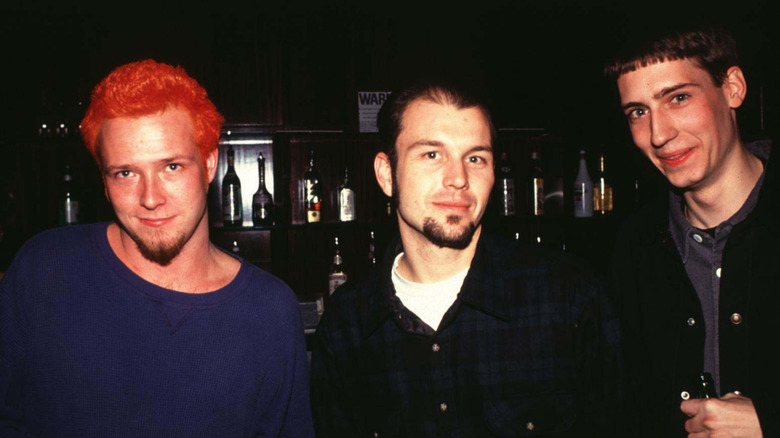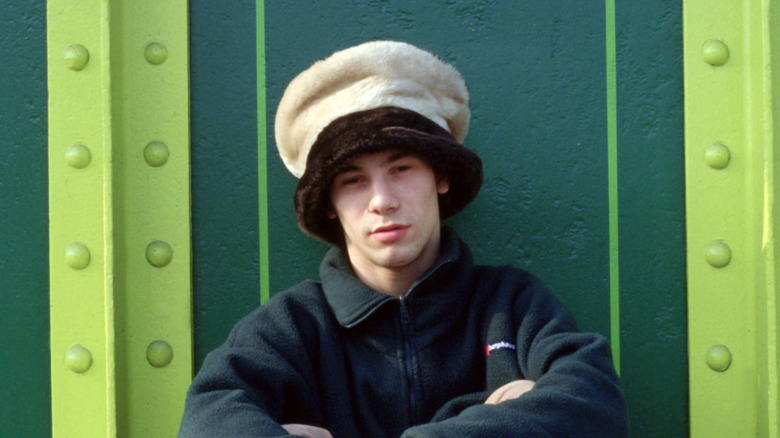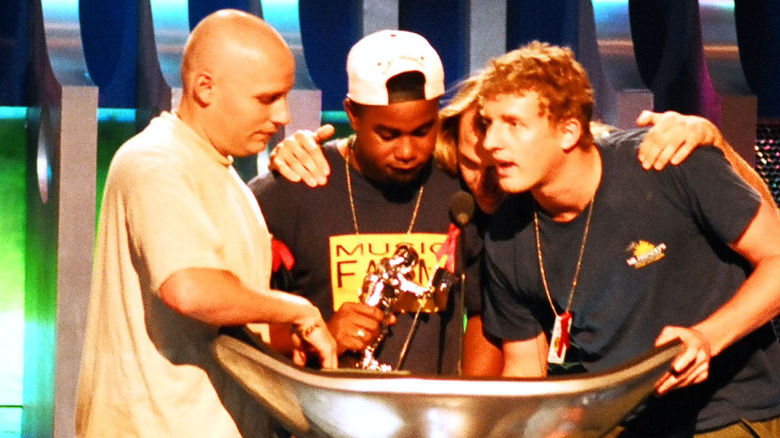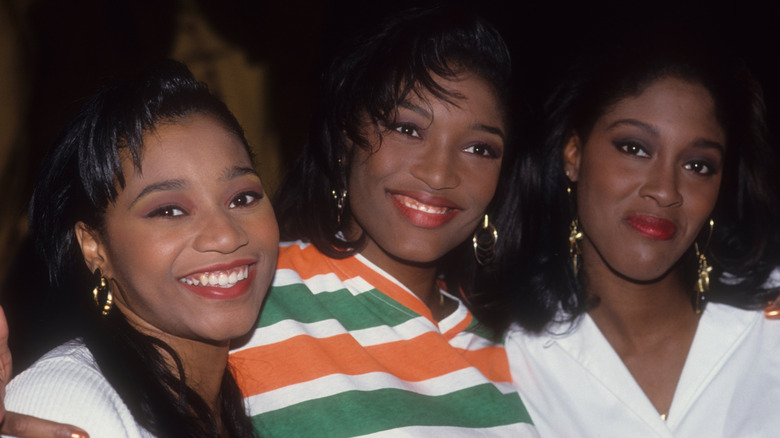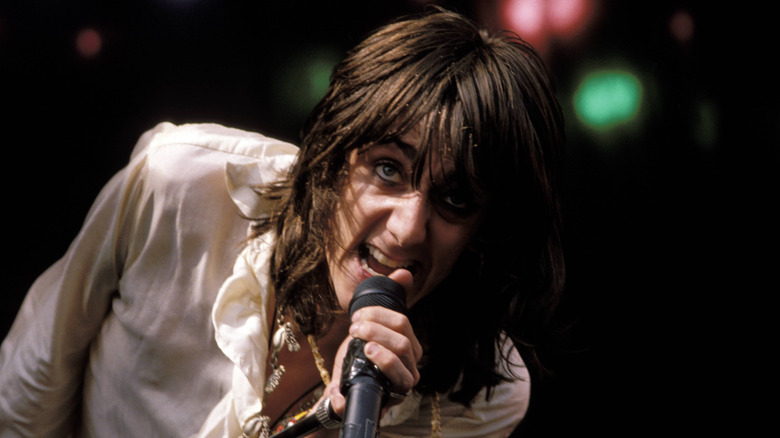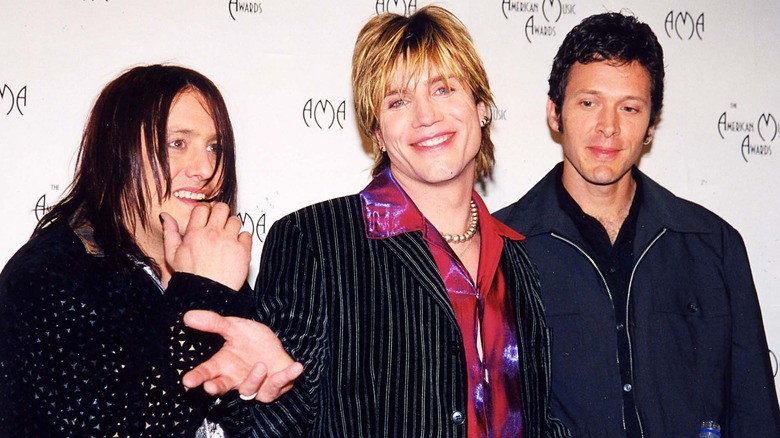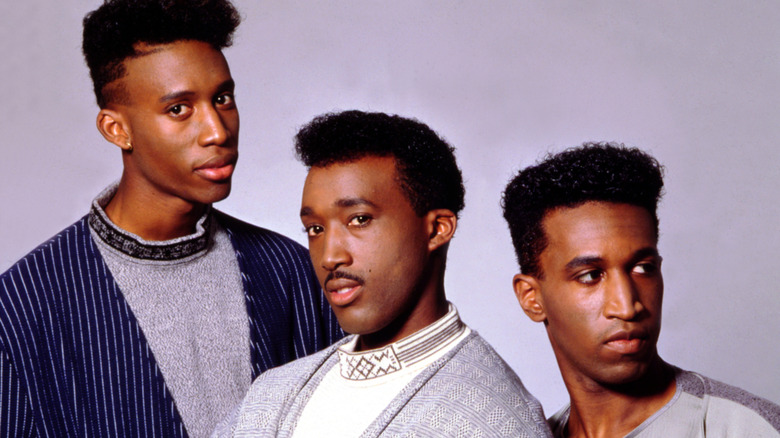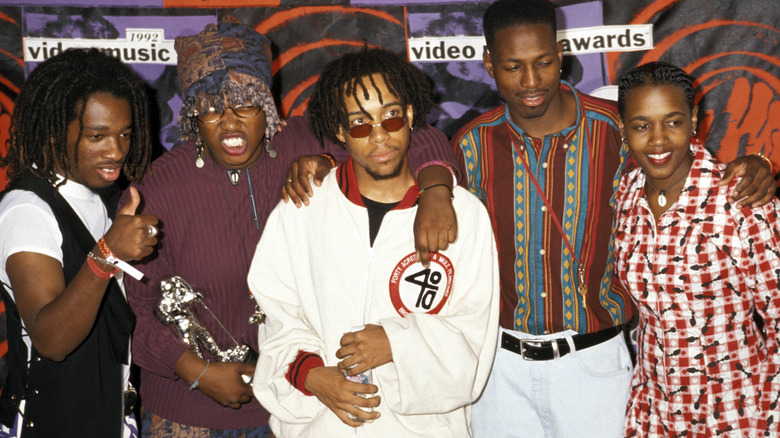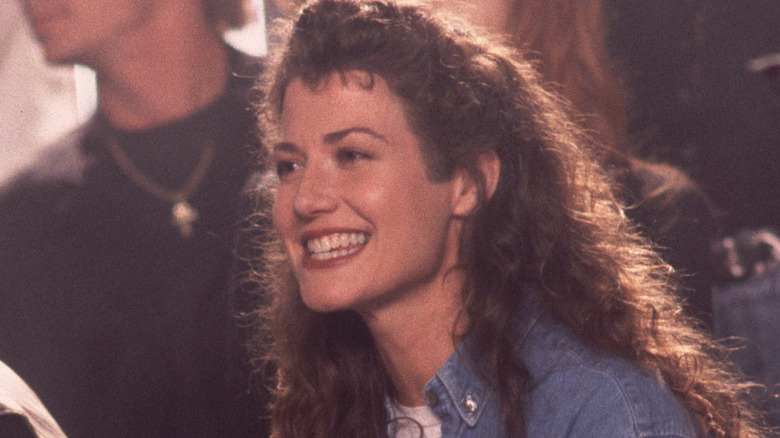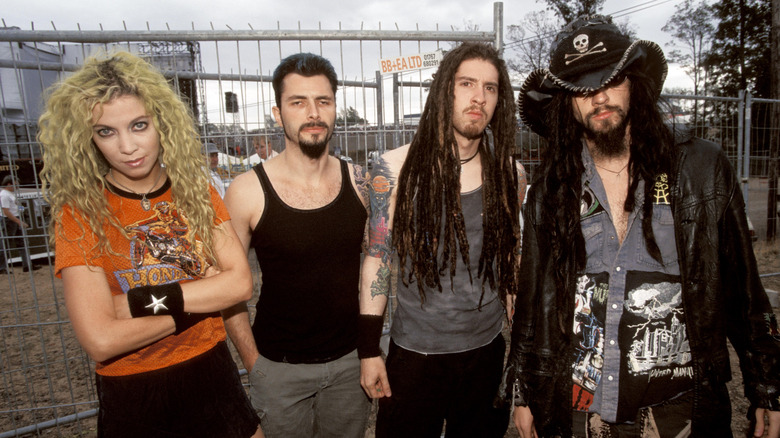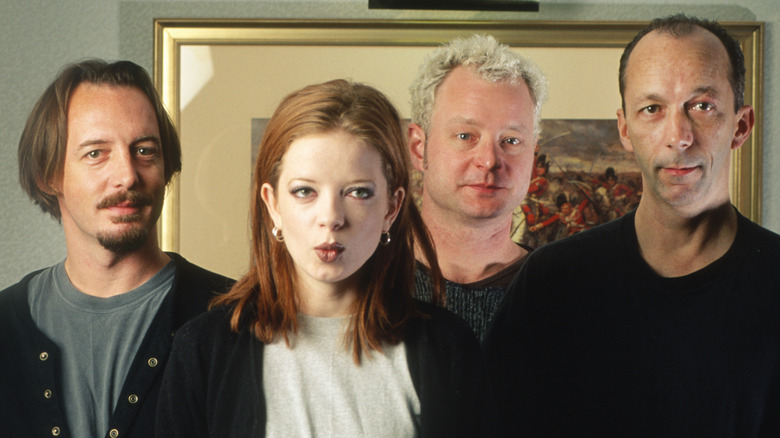'90s Musicians We Completely Forgot About
The 1990s were a particularly explosive and diverse period for music. Long gone were the days of the monoculture, with one form of pop rock ruling the airwaves. Instead, music continued to splinter into various genres and subgenres. The rise of different radio formats, the popularity of the affordable CD, and MTV still playing music videos helped grunge, gangsta rap, pop rap, throwback hard rock, dance pop, and soft rock all enjoy a historically creative and lucrative period.
So much vital music came out of the 1990s that not all of it could last forever. While there were plenty of one-hit wonders who deserved more than 15 minutes of fame, and lots of singers, bands, and groups that sold millions of albums and racked up memorable hits, many of the era's most notable musicians have had their names obscured and almost forgotten by the passage of time. We thought they'd be all-timers, or even members of the Rock and Roll Hall of Fame, not relics in less than three decades' time. Dig out your CD wallet, fire up the five-disc changer, and reminisce about all these acts forever tied to the '90s, for better or for worse.
Roxette
In the 1980s, Per Gessle's band Gyllene Tider was one of the most popular acts in Sweden. In the first half of the 1990s, his duo Roxette was among the most consistent hitmakers throughout Europe and North America. Gessle played guitar and harmonica and sang counterpoint to the powerful lead vocals of belter Marie Fredriksson. While Roxette's music was always lush and lavishly produced, the band could handle everything from dance pop to rock to soaring balladry. Among their respective hits: "The Look," "Listen to Your Heart," "It Must Have Been Love," and "Joyride," all of which reached No. 1 on the American pop chart.
The last time Roxette had anything close to a hit single in the U.S. was the No. 50-peaking hard rocker "Sleeping in My Car" in 1994. The duo remained popular in Europe throughout the decade, however. Roxette came to a slow and tragic end after Fredriksson was diagnosed with brain cancer in 2002. Roxette spent much of the 2000s not being an active band, and a comeback didn't last due the lead singer's health concerns. Marie Fredriksson died in 2019 at age 61.
The Presidents of the United States of America
With their absurdly grandiose name, the Presidents of the United States of America let listeners know right away that they weren't to be taken all that seriously. The group's self-titled 1995 debut album contained humor-inflected songs played by a stripped-down, straightforward power trio. Frontman Chris Ballew played a two-string bass and guitarist Dave Dederer's instrument had just three strings, which is all the band needed for its radio-friendly, punk-inspired cheekiness. The propulsive "Lump" preceded the double-entendre-drenched "Kitty," which the band then followed with "Peaches." The quirky pop-punk and MTV hit really was about a guy who wanted to move to the country and eat peaches everyday.
Album number two, "II," arrived in 1996 and generated minor hits, both car songs: "Dune Buggy" and "Mach 5." Nothing had the charm of its debut LP's singles, however, and after doing the theme song for the movie "George of the Jungle" and teaming up with fellow Seattle artist Sir Mix-A-Lot to form an act known as Subset, the Presidents released a digital-only album in 2000, before iTunes would make that a viable method. The band's label went bankrupt, and the Presidents of the USA disbanded the original administration in 2000.
Toad the Wet Sprocket
While the hard-edged and fuzzy Seattle-type bands got all the attention and loudly devoted fandom in the early 1990s, bands like Toad the Wet Sprocket were the ones quietly getting the most radio airplay. Named after a line in a Monty Python comedy record, Toad the Wet Sprocket was nonetheless a very serious band, creating emotional and affecting, mature pop rock full of shimmering guitars and anthemic vocals. In 1992 alone, Toad the Wet Sprocket struck it big with the pop, soft rock, and mainstream rock hits "All I Want" and "Walk on the Ocean." Two years later, "Something's Always Wrong" and "Fall Down" climbed to Top 10 positions on the alternative rock chart.
After the minor hit "Come Down" in 1997, Toad the Wet Sprocket broke up and embarked on low-key tours into the early 20th century. Chief creative force, frontman Glen Phillips, went solo and released a series of well-reviewed if little-noticed albums.
Babyface
Kenneth Edmonds, known to most as Babyface, was kicking around the music industry for more than a decade, helping others carve out careers, before he put himself front and center. With fellow songwriter and producer Antonio "L.A. Reid," he formed LaFace Records and crafted smashes for Pebbles and Bobby Brown, then showed off his singing on the album "Tender Lover," which generated the hit "It's No Crime." In the '90s, Babyface co-wrote and produced the No. 1 hits "I'm Your Baby Tonight," "Take a Bow," and "End of the Road" for Whitney Houston, Madonna, and Boyz II Men, respectively.
Ditching his trademark heavy production style for his 1993 solo album "For the Cool in You," Babyface's acoustic guitar-and-vocals-only torch song "When Can I See You Again" won a Grammy and went to No. 4. Throughout the '90s he kept producing for big stars like Mariah Carey, En Vogue, TLC, and Mary J. Blige, and occasionally appeared on record, too. He prominently performed backing vocals on Eric Clapton's "Change the World," the 1997 Grammy winner for song and record of the year.
PM Dawn
In 1991, Billboard began compiling its charts with the aid of SoundScan, a point-of-sale service that determined what people were truly buying in stores and provided an accurate, real-time notion of what was popular. The first single to hit No. 1 in the SoundScan era was "Set Adrift on Memory Bliss," an introspective, sample-heavy, pop-psychedelic rap song from a duo called P.M. Dawn. That song was a representative taste of what brothers Prince Be and DJ Minutemix did with their project, which combined styles so thoroughly it sounded like everything and nothing else all at once. "I'd Die Without You" and "Looking Through Patient Eyes" made it almost all the way to No. 1 in the brief period that P.M. Dawn was the biggest thing in hip-hop.
What's considered cool and current in rap changes quickly, and P.M. Dawn couldn't manage even a minor hit after 1998. It certainly didn't help when DJ Minutemix, aka Jarrett Cordes, was accused of assaulting a minor female relative. Rapper Prince Be sustained serious health issues, and complications of diabetes including a stroke, partial leg amputation, and kidney disease precluded his death in 2016 at age 46.
Collective Soul
Despite coming up in the messed-up 1990s music industry that aggressively marketed artists to potential fans, Collective Soul sold a lot of records while remaining relatively anonymous. Rarely did the names and faces of its members appear on billboards or in important music publications, but it didn't matter, because Collective Soul was a hit factory. Emerging in 1994, when the Seattle sound was on its last legs, Collective Soul's tightly produced, defanged version of grunge came to define rock radio for the rest of the decade. Its singles "Shine," "December," "The World I Know," "Where the River Flows," "Precious Declaration," "Listen," and "Heavy" all topped the rock chart in the 1990s.
As the post-grunge sound gave way to harder, sludgier music and rap-rock in the late 1990s, Collective Soul faded into obscurity. Since the 2000s, its members have concentrated on side projects, although in 2024, Collective Soul toured with fellow '90s refugees Edwin McCain and a briefly reunited Hootie and the Blowfish.
Elastica
Defined by plenty of melody and hooks and crunching electric guitars, the style called Britpop defined U.K. rock in the 1990s. While a handful of bands with that designation made a lasting impact in the U.S., like Oasis and Blur, other acts got caught up in the moment and exported to the U.S. for a short-lived modicum of fame and praise, too, such as Elastica. Its songs were short, syncopated, and riff-driven, harkening back to both '70s punk and '80s New Wave. All that underscored the vocals of band leader Justine Frischmann, who delivered her lyrics in a charmingly jaded and slightly disaffected manner. Elastica's hits "Connection," "Stutter," and "Car Song," all from the band's self-titled debut, the quickest-selling first album ever in the U.K. at the time, proved irresistible to alternative rock media on both sides of the Atlantic Ocean.
Elastica had trouble moving into the future, with original band members leaving and then reappearing in the late 1990s so much that it took until 2000 for the band's second album, "The Menace," to get finished. Shortly afterward, with the Britpop era ending anyway, Elastica broke up.
Spin Doctors
The Spin Doctors brought a funky, blues-based, jam-band sound to the burgeoning alternative rock scene in the early 1990s. A popular live band in New York and on tour for those reasons, the Spin Doctors were much more precise on record. A sensation for just over one year, from the summer of 1992 through the summer of 1993, the Spin Doctors made populist, danceable rock for the masses, and it launched exactly two Top 20 hits: the playfully scornful "Little Miss Can't Be Wrong" and the love triangle narrative "Two Princes."
Other singles from the Spin Doctors' breakthrough album, "Pocket Full of Kryptonite," failed to register, and the anticipated follow-up, "Turn It Upside Down," flopped, in major part because the first single was "Cleopatra's Cat," a wildly divergent Beat poem set to a funky bass line. By the end of the decade, Epic Records had dismissed the Spin Doctors, which had barely survived the exit of its original bassist and guitarist.
Nelson
Twins Matthew and Gunnar Nelson had a lot of angles they could use to propel their rock star careers, and they seemingly used all of them. After making a few appearances in the late 1980s in the metal band Strange Agents, the duo rebranded as Nelson, brought in a bunch of other musicians, and released the 1990 hair metal LP "After the Rain." Omnipresent in any coverage of the band, and its music videos, were the brothers' manes of long, blond hair. And as this was the 1990s, long before "nepo baby" was a dirty word and stars didn't want you to know they had famous parents, Nelson proudly and often shared the fact that they were the twin sons of early rock 'n' roll icon Ricky Nelson, and also the grandsons of Ozzie and Harriet Nelson, stars of the 1950s sitcom "The Adventures of Ozzie and Harriet."
Nelson rode the wave of built-in celebrity and making music in probably the most popular style of the time. "After the Rain" sold 2 million copies, fueled by the No. 1 hit "(Can't Live Without Your) Love and Affection" and other smashes like the title song, "More Than Ever," and "Only Time Will Tell." When grunge rock came around, it captured rock fans' attention, and Nelson quickly grew passé. Nelson continued to record and evolve its sound, but the brothers were never as successful as they were in the early 1990s.
Stone Temple Pilots
A bit more metal than the grunge bands with whom it was often associated in the early 1990s, Stone Temple Pilots changed up its sound and remained a viable rock act through the entire decade. The band won the 1993 MTV Video Music Award for best new artist in a video for "Plush," an ominous hard rocker that also scored a Grammy for best hard rock performance with vocal. Guitarist Dean DeLeo and gravelly singer Scott Weiland churned out lots of hit tunes of various sounds in the '90s, like "Wicked Garden," "Creep," "Interstate Love Song," "Vasoline," "Big Bang Baby," and "Trippin' on a Hole in a Paper Heart."
Weiland dealt with persistent substance abuse issues during his tenure in Stone Temple Pilots, and while he was seeking treatment in a rehab program in the late 1990s, the rest of the band recorded an album under the name Talk Show. After breaking up and reuniting in the 2000s, Stone Temple Pilots fired Weiland in 2013, via a press release. "Stone Temple Pilots have announced they have officially terminated Scott Weiland," it read (via Rolling Stone). After bringing in Linkin Park singer Chester Bennington for a couple of years, the band hired a permanent frontman in Jeff Gutt in 2017, and the four-piece has since recorded and toured with the new lineup.
If you or anyone you know needs help with addiction issues, help is available. Visit the Substance Abuse and Mental Health Services Administration website or contact SAMHSA's National Helpline at 1-800-662-HELP (4357).
MC Hammer
In 1990 and 1991, it appeared as if MC Hammer could be the biggest star of the 1990s. A remarkable dancer as well as a rapper, he helped bring hip-hop to the pop charts by making it family-friendly. "U Can't Touch This" and "Pray" were inescapable, while his album "Please Hammer Don't Hurt 'Em" became the first rap album to sell 10 million copies.
MC Hammer's act became perceived as stale quite quickly, and he tried to reinvent himself and evolve with each successive album. In 1991, the bombastic "2 Legit 2 Quit," by the just-renamed Hammer, peaked at No. 5, not quite justifying the expensive, celebrity cameo-laden music video. "Addams Groove," a corny rap theme song for the soundtrack to "The Addams Family" film, would mark the last time Hammer was a Top 10 act. The public wasn't too interested in the rapper's 1994 attempt to present himself as an aggressive lothario with "It's All Good" and "Pumps and a Bump," and the sincere, gospel-oriented "Inside Out" sold so poorly that Giant Records cut ties with Hammer. By the 2000s, MC Hammer was known less for his music and more as a cautionary tale. As depicted in his notorious episode of VH1's "Behind the Music," MC Hammer's lavish spending at the height of his fame led to bankruptcy. He later got his affairs in order and became an ordained, practicing minister and a tech investor.
Jamiroquai
Getting a video into heavy rotation on MTV was so important in the 1990s that if an act managed it, they could be launched to virtually overnight stardom, if only in the network's realm of influence. Jamiroquai had found some fame in the early 1990s in its native England, where it was a major factor in the acid jazz movement. Its spacey, futuristic vibe blended jazz, funk, dance, and soul together, and songs like "Too Young to Die," "Space Cowboy," and "Blow Your Mind" delighted U.K. audiences. It took until 1997 for Americans to discover Jamiroquai. MTV picked up the video for "Virtual Insanity," which depicted frontman Jay Kay wearing one of his signature large hats and dance-navigating a room with moving floors. It won the MTV Video Music Award for video of the year in 1997, and Jamiroquai earned some minor radio and dance club play for "Virtual Insanity," "Cosmic Girl," and "Alright."
As much as the MTV-centric world was wild about Jamiroquai in 1997, the attention quickly drifted away. About the last time that Jamiroquai was a big deal in the U.S. was in 2004, when the indie movie of the moment, "Napoleon Dynamite," featured its awkward title character dancing to the group's 1999 single "Canned Heat."
Hootie and the Blowfish
Grunge and gangsta rap are arguably the most '90s-specific genres, but one of the best-selling albums of the entire decade was a collection of low-key ballads and anthemic party jams from a band that honed its skills on the Southern college circuit. About 22 million people bought a copy of "Cracked Rear View" by Hootie and the Blowfish, which took its name from two friends of the band members, not even anyone in the group. Released in 1994, "Cracked Rear View" slowly turned into a juggernaut on the strength of the singles "Hold My Hand," "Only Wanna Be With You," and "Let Her Cry." Hootie and the Blowfish won the best new artist award at the Grammys, the MTV Video Music Awards, and the American Music Awards. The band even factored into the plot of an episode of the '90s' biggest sitcom, "Friends."
It seemed like Hootie and the Blowfish would stick around, but initial success like it experienced is almost impossible to replicate. Most of the people who bought "Cracked Rear View" didn't buy the next album, "Fairweather Johnson," which moved a mere 3 million copies. By the end of the 2000s, the band had gone mostly dormant so lead singer Darius Rucker could become a solo superstar in country music.
SWV
En Vogue so dazzled listeners in the early 1990s that it led to a boom in multi-member female vocal groups, calling back to the "girl groups" of the 1960s while also adopting the modern sounds of dance pop and hip-hop. The trendsetter is still fondly remembered today, perhaps at the expense of some of the other early '90s singing collectives it inspired. Cheryl Gamble, Tamara Johnson, and Leanne Lyons, employing the stage names of Coko, Taj, and Lelee, called themselves Sisters with Voices, or SWV for short. In 1992 and 1993, R&B and pop radio churned out SWV hits, all of them mixing harmony and impressive vocal theatrics with thumping beats and synth lines, very much in line with the New Jack Swing style endemic to the era. After "Right Here" established the trio's sensibility, "I'm So Into You," "Weak," and a remixed version of "Right Here" that incorporated Michael Jackson's "Human Nature" raced up the pop and R&B charts. More smashes like "You're the One" came along from later SWV albums, but the trio split apart in 1997.
A reunion album sold well in 2012 and it directly segued into the cable reality show "SWV Reunited," which depicted the group's modest comeback before it ended production around 2015.
Black Crowes
The relatively new sounds of alternative rock weren't for everyone. Those who wanted their rock music to be straightforward, bluesy, and old-fashioned, but coming from the mouths and instruments of up-and-coming performers, could get their fix from the Black Crowes. Spiritually a 1970s band making its way through the 1990s, the Atlanta-based group crafted its sound by pulling elements from Southern rock, British Invasion, and arena rock bands. The Black Crowes' first two albums, 1990's "Shake Your Money Maker" and 1992's "The Southern Harmony and Musical Companion," sounded like they came from a generation earlier, and they launched big-sounding, catchy hits like "Jealous Again," "She Talks to Angels," "Remedy," and "Hard to Handle," a cover of an Otis Redding chestnut from the '60s.
As the '90s progressed, and into the 2000s, the Black Crowes moved away from its signature throwback sound and into more experimental territory. Vital members came and went, and despite some reunions, the group never returned to its early '90s heights. In 2025, the group was nominated for entry into the Rock and Roll Hall of Fame but didn't receive enough votes.
Goo Goo Dolls
The Goo Doo Dolls spent the late 1980s and early 1990s largely toiling in obscurity as a grimy, noisy power trio with a punk-meets-metal sound. After releasing some indie albums to a cult audience, the Goo Goo Dolls signed with Warner Bros. to distribute its LP "A Boy Named Goo." Employing more of a mid-1990s alternative rock vibe as well as a pop sheen, the attempt at commercial viability worked. "Long Way Down" and "Naked" did well at rock and alt rock radio, while the acoustic ballad "Name" became a Top Five pop hit. The public wanted a softened Goo Goo Dolls, and the band obliged, applying the slow, jangly, and emotional vibe of "Name" full time. Familiar-sounding hits like "Slide," "Dizzy," and "Black Balloon" followed, but none of the magnitude of "Iris." That soaring ballad, recorded for the soundtrack of the 1998 romantic drama "City of Angels," sat at No. 1 on Billboard's radio airplay chart for 18 weeks.
As radio and listeners moved on from the Goo Goo Dolls in the 2000s and beyond, the band itself continued but in a reduced capacity. Drummer Mike Malinin sued in 2013 after being terminated for what he believed was requesting paternity leave, while remaining members John Rzeznik and Robby Takac were barely on speaking terms.
Tony! Toni! Tone!
A lot of sound came out of just the three musicians who formed the core of Tony! Toni! Toné! They were a hip-hop-adjacent New Jack Swing band but also an old-fashioned soul combo that clearly knew a lot about gospel and jazz. The three key members, brothers D'Wayne Wiggins and Raphael Saadiq and cousin Timothy Christian Riley, harmonized and played well together, and by the early 1990s, they were recording eminently likable dance-floor-fillers like "Feels Good" and "If I Had No Loot" as well as unabashedly romantic treasures like "Anniversary" and "(Lay Your Head on My) Pillow."
Disputes over musical direction caused Tony! Toni! Toné to disband in 1998, and Saadiq launched a notable solo career. The band regrouped in 2023 but wasn't able to record anything new after Wiggins was diagnosed with bladder cancer. He died in 2025 at age 64.
Sarah McLachlan
After establishing a moderate following in her native Canada and the United States in the late 1980s with "Touch," Sarah McLachlan's ethereal and provocative indie-folk meets alternative rock found a much larger audience with 1993's "Fumbling Towards Ecstasy." It included the haunting "Possession," about McLachlan's experience with a stalker, as well as emotional and intimate ballads like "Good Enough" and "Hold On." After writing and recording the enduring adult contemporary hit "I Will Remember You" for the soundtrack to "The Brothers McMullen," McLachlan returned even bigger in 1997 with the more rock-oriented "Surfacing." That summer, McLachlan organized and headlined the first edition of the annually touring and highly successful Lilith Fair. It featured a lineup of only female singer-songwriters and female-fronted bands, such as Jewel, Fiona Apple, Tracy Chapman, and the Indigo Girls.
In the 21st century, McLachlan's contemporary recordings didn't receive as much attention as her '90s work. Her deeply sad 1997 single "Angel" became the soundtrack for a long-running series of commercials featuring footage of abused and abandoned animals urging donations to the ASPCA.
Arrested Development
In 1992, the sprawling musical collective Arrested Development released "3 Years, 5 Months, and 2 Days in the Life Of..." and electrified the mainstream music world. With socially conscious hip-hop that called out societal ills and espoused spirituality, progressive politics, and cultural pride, Arrested Development pulled from rap, rock, pop, soul, and folk equally, and resonated with record-buyers with thoughtful singles like "Tennessee," "People Everyday," and "Mr. Wendal." Arrested Development became the first-ever rap artist to win the Grammy Award for best new artist.
Hip-hop fans apparently thought that one album's worth of the progressive sound of Arrested Development was plenty. After the first LP sold more than 3 million copies, the next one, "Zingalamaduni," debuted at a surprisingly low No. 55 and struggled to sell 60,000 copies in its first month. Subsequent albums arrived over the years with little notice, while Arrested Development reminded those who may have forgotten about the group in 2003, when it sued Fox in an attempt to get it to change the name of the sitcom "Arrested Development."
Amy Grant
An undeniable superstar from the outset in the niche of contemporary Christian pop music, Amy Grant crossing over to mainstream pop was inevitable. After some of her religious songs landed on the Hot 100 in 1985, Grant's duet with former Chicago lead singer Peter Cetera, "The Next Time I Fall," went to No. 1 in 1986, setting the stage for her 1991 secular debut, "Heart in Motion." Full of ballads and jaunty pop songs, "Heart in Motion" sold 5 million copies and spawned five Top 20 hits, including the chart-topper "Baby Baby." The 1994 follow-up LP "House of Love" included hits like "Lucky One" and the title track, a duet with Grant's future husband Vince Gill.
As soft rock faded from pop radio and MTV, Grant's music still got a lot of play on adult contemporary radio, but after the 1990s, she returned to Christian pop. Grant has focused on religious and Christmas albums for the last couple of decades. Her last album in the vein of "Heart in Motion" was "Simple Things," which was released in 2003.
White Zombie
"Beavis and Butt-Head" caused a stir when it premiered on MTV in 1993. Episodes of the animated series featured the titular teenage buffoons astutely riffing on music videos, and their cultural influence was such that if they said a band rocked, that act's sales could skyrocket. That was a fate enjoyed by White Zombie, a band that played danceable heavy metal influenced by horror movies and kitschy culture. After Beavis and Butt-Head gave their vigorous approval to the group's video for "Welcome to Planet Motherf***er," sales of White Zombie's LP "La Sexorcisto: Devil Music Vol. 1" increased fourfold, and the album entered Billboard's Top 40. Then "Thunder Kiss '65" and "Black Sunshine" became rock radio hits, and so did "More Human Than Human" and "Electric Head Pt. 2" from the next album, "Astro-Creep 2000." Both White Zombie records sold more than 2 million copies apiece.
And for its next trick, White Zombie split up. Rob Zombie pursued a solo career in 1998, which included music and film directorial work. It was so successful that it pretty much overshadowed everything he did with the band that brought him fame and fortune.
Garbage
Presenting a medley of menace and melancholy to go with both shredding guitars and electronic bleeps, Garbage sounded like the future of music. Its eponymous debut in 1995 placed veteran indie rock singer Shirley Manson at the forefront of a wall of sound concocted by the band's other members, all acclaimed and influential producers and engineers, including Butch Vig, Duke Erikson, and Steve Marker. Dark, disorienting, and still somehow catchy hits like "Vow," "Queer," "Only Happy When It Rains," and "Stupid Girl" followed. Garbage was everywhere by the end of the '90s, contributing cuts to the soundtracks of "Romeo + Juliet" and "The World Is Not Enough" and rolling out its second LP, "Version 2.0," which included "Special," "Push It," and "I Think I'm Paranoid."
Audiences grew tired of the sounds of the future in the present, and by the early 2000s, Garbage became a band of the past, forever linked to the culture of the decade prior. The band remained active into the 21st century but only occasionally made a showing on the charts. Its last big single was the No. 8 alternative rock hit "Why Do You Love Me" in 2005.
